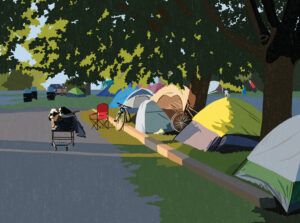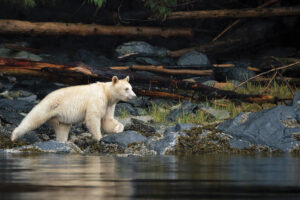
People & Culture
Kahkiihtwaam ee-pee-kiiweehtataahk: Bringing it back home again
The story of how a critically endangered Indigenous language can be saved
- 6310 words
- 26 minutes
This article is over 5 years old and may contain outdated information.
People & Culture

Without an inkling of sailing knowledge, writer Arno Kopecky set out on a sailboat with a friend and photographer to get a sense of the vast swath of coastal water and wilderness that could be impacted by the proposed Northern Gateway pipeline. If approved, the pipeline will pump Alberta crude oil from the oil sands to Kitimat, B.C., where it will be unloaded onto ships for foreign markets. Kopecky’s new book The Oil Man and the Sea traces his journey through a number of coastal First Nations territories as well as the Great Bear Rainforest and waters filled with orca, humpback whales and thousands of salmon and other fish. Canadian Geographic caught up with the journalist to ask about his experiences writing his book just as a federal government Joint Review Panel decision endorsed the pipeline.
Can Geo: Why did you choose this trip?
I’d just spent a year in the Amazon in Peru and Colombia, then moved back to Squamish, B.C. I was sitting down to write The Devil’s Curve, which was a book about resource extraction on native land in isolated places. The president of Peru wrote an open letter to his countrymen excoriating environmentalists as foreign-funded radicals, saying anyone opposed to any particular industrial project was opposed to all economic development. Northern Gateway is the exact same story, only it’s on Canadian soil. It was also a personal story because this was now my backyard. It’s Canada’s water — I eat the salmon in that ocean. I surf in that ocean. I take the ferry over that ocean every day.

Can Geo: Did you notice any obvious misconceptions with common stereotypes of First Nations during your experience?
They certainly live in direct contact with the physical land that surrounds them, including the ecosystems, salmon cycles and halibut cycles. Because they see it every day they are more in touch with it that way, but to suggest that they are somehow more environmentally attuned than the rest of Canada or the world is not true. Ultimately, humans are humans, and the cultural traits they display have more to do with political and geographic conditions than any internal genetic expression.
Can Geo: Do you think population resurgence among First Nations will help people like the Heiltsuk and Haisla regain control of traditional land?
Definitely. First Nations are the fastest growing demographic in the country right now. There’s now the first generation growing up that hasn’t been influenced directly by the residential school legacy. They all have parents and uncles and grandparents who went through it, but nobody today is growing up in a residential school.
You’re seeing a lot more cultural pride, a lot of young leaders coming up who are really confident working in their traditional cultural landscape. But they also have university degrees and have lived in cities and know both worlds very well. I really think the time of the First Nations has come in a way — the tide has been reversed. Things have been going from bad to worse for so long and my sense is that it has changed. There’s still a lot to be fixed but the trend is toward better now.

Can Geo: Did you learn anything about sailing by the end of the journey?
I call myself a landlubber who survived three months at sea, not a sailor. I learned the basics: I learned how to navigate, I can raise a sail and I can read charts. The one thing I never really learned was how to fix an engine. I think I’d be an okay deckhand in the future, but I wouldn’t want to captain my own boat.
Can Geo: How do you think pipeline politics will play out now that the Joint Review Panel has endorsed Northern Gateway?
The panel’s decision was never going to be the end of the story, no matter what they decided. The betting money has always held that Northern Gateway will ultimately be approved by the federal government, which has hardly been cagey about its position.
Are you passionate about Canadian geography?
You can support Canadian Geographic in 3 ways:

People & Culture
The story of how a critically endangered Indigenous language can be saved

People & Culture
For unhoused residents and those who help them, the pandemic was another wave in a rising tide of challenges

Wildlife
How ‘maas ol, the spirit bear, connects us to the last glacial maximum of the Pacific Northwest

Places
In Banff National Park, Alberta, as in protected areas across the country, managers find it difficult to balance the desire of people to experience wilderness with an imperative to conserve it